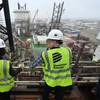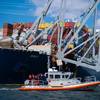The Port of Seattle Commissioners took action to create its 2018 Energy and Sustainability Committee and identify top environmental priorities to reduce greenhouse gas emissions and further innovative collaborations to protect the air and water quality of surrounding communities.
Co-chaired by Commissioners Fred Felleman and Ryan Calkins, the Committee develops policy recommendations and provides oversight of strategic conservation decisions the Port will make in 2018 and 2019.
These efforts are designed to further the Port’s Century Agenda’s goal to “be the greenest and most energy-efficient Port in North America” and “meet all increased energy needs through conservation and renewable sources.”
“The Port is making good on its promises to protect the environment both locally and globally. It’s our commitment to improve both the health and wealth of our communities,” Commissioner Felleman said. “We appreciate the work of the many agency, industry, community and environmental advisors who provided invaluable assistance in developing our goals.”
“As the Port grows, we will continue to be sensitive to the needs of our neighboring communities, both for a healthy environment and for stable, good-paying jobs. We have made great progress on environmental impacts, but there is much more work to do,” said Commissioner Ryan Calkins.
The Energy and Sustainability Committee outlined four specific priorities in its work plan: advancing the use of Sustainable Aviation Fuels, launching an aquatic carbon sequestration, “Blue Carbon,” strategy, establishing a Sustainable Evaluation Framework for project reviews and updating the Port’s environmental awards.
The Port’s commitment to reduce its greenhouse gas and other emissions is documented in the recent publication of its 2016 Air Emission Inventory. Due to efforts by the Port, in partnership with other ports, government agencies, and industrial partners between 2005 and 2016 there was a 72% reduction in diesel particulate matter and 10% reduction in CO2e emissions associated with maritime-related activities during this period of significant economic growth
















